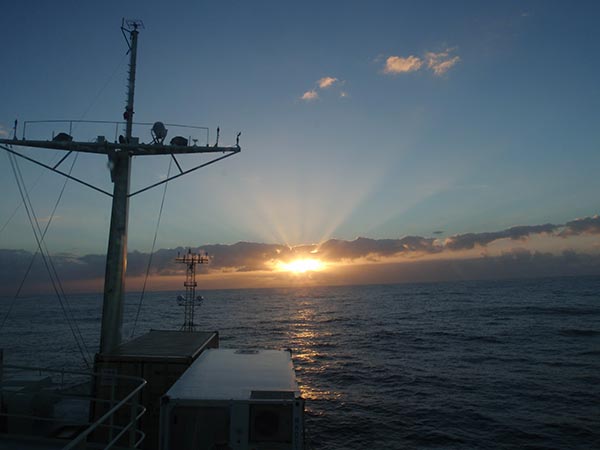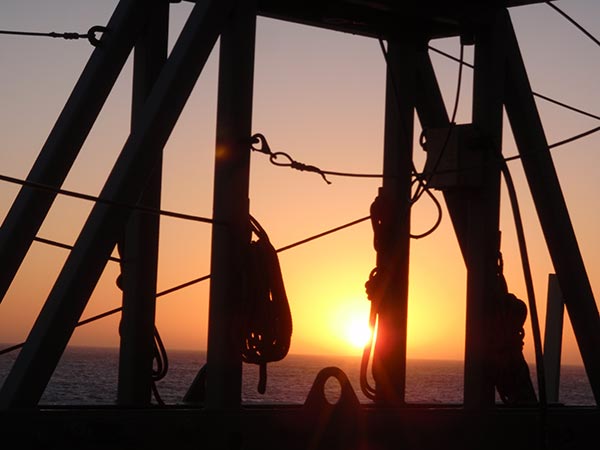
Shortly after breakfast they retrieved the CTD for the last time, lashed it to its pallet, and pulled it back into its hanger home. Without delay, Second Mate Derek turned Knorr southwest for Cape Town and poured on the power. The mooring techs have already packed their gear ready for shipping back to Florida. Some members of the crew, who have been at sea except for short port calls for the last four months, are itching to pick up their shoreside lives. “Channel fever” has definitely set in. For me familiar nostalgic feelings are taking hold. This is my second trip aboardKnorr, a reunion with fine friends from the engine room to the bridge. After we dock in Cape Town, I’ll leave the ship with some regret. I hope to find my way back aboard Knorr, but I can’t say where or when.
After a short call to refuel, re-provision, and off load our tools, instruments, and personnel, Knorr will carry on into another ocean in the other hemisphere. In Barbados, she’ll pick up the next science party with other objectives and then another after that. And so the rhythm of her work will continue for at least the next five years (people are talking about replacing her after that, but I don’t want to go there).
So this seems an appropriate point to consider the meaning of this cruise and by extension others like it. We’ve been out here at considerable cost and human effort studying a current most people have never heard of. Lisa has funded the cruise with her National Science Foundation grant. The NSF—itself funded by U.S. taxpayer dollars—wants people to understand how and why their money is being spent on ocean research. This of course implies communication between scientists and the rest of us. It seems to me that the lines of communication are not healthy and humming, though perhaps there may be signs of positive change. Let’s look at the matter first from the scientist’s perspective.
Pure research scientists like Lisa, though affiliated with a university, receive little or no salary. They live on grants mainly from the NSF—no grants, no security. Some scientists teach, but teaching is not typically their job. They spend most of their working hours writing grant proposals, fully aware that the success rate is small. They have little time to think about public outreach, let alone perform it, even if they’d like to. Further, science has become highly specialized, each with its own esoteric language, due to the very bulk of information scientists have accumulated over, say, the last 60 years. This is a signal of their success, but it also tends to forestall communication even among scientists, even within the branches of oceanography. For instance, physical oceanographers seldom cross paths with marine biologists; they don’t travel in the same circles nor write for or read the same technical journals. Finally, to risk a generalization, scientists are not convinced that the public is particularly interested in hearing about their work. (When one evinces interest, they are effusive and generous.)
Meanwhile, nonscientists perceive that science is way too hard, these wiggy scientists with their arcane, geeky lingo, can’t understand a thing they say. And, anyway, what has the Deep Western Boundary Current, Agulhas Current, thermohaline circulation and the rest have to do with my life? Everybody’s busy, not just scientists. Why expend the effort to understand the ways and means of the ocean? It’s not an unreasonable question.
Not so long ago botanists, geologists, biologists, atmospheric scientists, glaciologists, oceanographers began almost by chance to talk among themselves, sharing data, and as a direct result, they discovered global warming. They discovered that humans had become a geophysical force—that the works of man, our tremendous technological success, modern life itself, were altering world climate.
Only scientists—not politicians or talk-radio bloviators—can tell us anything true about climate. And what scientists are telling us is disquieting, essentially that our fundamental lifestyle, the ways we use, and use up, natural resources is unsustainable. Reactionary forces have successfully seized the climate-change discussion, intentionally confusing the issues involved. It’s not hard to see why scientists don’t step readily into that street fight. And the issue is easy to confuse, because climate science is complex, multidisciplinary, and hard to measure. Global-warming, climate-change, and our awareness of the part we play in both might still bridge the gulf between scientists and the rest of us. Maybe we’ll learn to talk to one another, but both will need to make the effort to meet halfway across the divide.
This brings us back aboard Knorr and Lisa’s study of a current most people have never heard of. Because the Agulhas flows hot—at 70 million cubic meters per second—along the east coast of South Africa, it influences if not determines local climate conditions. And because some portion of its water whirls away from the main flow near the retroflection into the South Atlantic, the Agulhas serves as the only known link between the Indian and Atlantic oceans. To sever any link in the Ocean Conveyor would result in rapid, radical climate change. Air determines the climate’s course in the short term, but the ocean is captain in the long term.
Okay, the Agulhas and the rest of the ocean currents affect our lives. But, one might ask, won’t they continue doing what they do, and won’t scientists continue studying them whether or not I pay any attention to the science? Yeah, that’s true for the current or at least so we hope, but not necessarily for continued funding. Then try this: Scientists seek to explain how our world, how nature works; that’s part and parcel of their job. We live in the world. Is that reason enough to make the intellectual stride to meet them halfway? And there’s a related matter. Science remains part of our culture, though nowadays we don’t think of it in those terms, no different from music, film, or literature. Few of us ask why listen to music, why read a book? And besides, once the specialized jargon is subtracted, Earth science isn’t that hard. Earth, after all, is our home.
Anyway, our cruise nears its end. All in all, it was a smashing success. Nothing broke, and nothing was lost; no one was injured, at least not seriously; even the weather gave us a break. In two days, we’ll be at the dock. I, for one, will miss these shipmates, this ship, and the blue of the Agulhas Current.






